10 open source coding books to read in 2023
Open source technology and programming languages are the foundation of modern software development. Use these books to take advantage of all that open source software has to offer.
Open source is a term for software that anyone can modify, inspect and share. Open source software exists to enable transparency and community-based software development with the idea that when everyone can contribute to code, more innovation opportunities are created.
Learning about Open Source software is a great way to gain valuable knowledge and skills that open doors for programmers. For beginners, learning open source techniques and tools is a great point of entry. For experienced programmers, open source is a great way to improve work, make programs more efficient and collaborate in ways that would typically be prohibited by proprietary technology.
Below are some useful open source software books for prospective learners to dig their teeth into.
1. Dead Simple Python: Idiomatic Python for the Impatient Programmer
Author: Jason C. McDonald
Publisher: No Starch Press
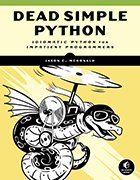
Dead Simple Python is an invaluable resource for those looking to learn the fundamentals of the Python programming language. This book is designed to quickly teach readers how to write programs and create applications using Python. It starts off by introducing the basics of the language, such as data types, loops and functions. It then moves on to more advanced topics, such as generator expressions and concurrency. The book contains several exercises and challenges that further reinforce the reader's understanding. Dead Simple Python is an ideal choice for Python beginners who want to quickly advance from the bare basics to production-level coding.
Learn more about this book here.
2. Forge Your Future with Open Source: Build Your Skills. Build Your Network. Build the Future of Technology
Author: VM (Vicky) Brasseur
Publisher: The Pragmatic Programmers
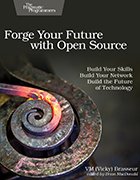
Forge Your Future with Open Source helps readers understand the open source software foundations. It enables them to take a practical approach to contributing to, maintaining and developing open source software. Readers of any skill level can use this book to learn the mechanics of open source contributions, and how those contributions benefit the community and advance individual careers. It also teaches readers how start their own projects and invite other contributors to it.
Learn more about this book here.
3. Implementing Enterprise Cybersecurity with Opensource Software and Standard Architecture
Editors: Anand Handa, Rohit Negi and Sandeep Kumar Shukla
Publisher: River Publishers
Implementing Enterprise Cybersecurity with Opensource Software and Standard Architecture provides a comprehensive guide for anyone looking to develop and maintain an effective enterprise cybersecurity architecture. It covers topics such as security policy, assessment and operations. It provides detailed explanations of the various open source software tools available for implementing enterprise cybersecurity. It also describes the necessary steps for establishing a standard architecture for an enterprise cybersecurity system and provides detailed case studies to illustrate how the concepts and tools discussed in the book can be applied in real-world contexts. It may be useful to small and medium-sized businesses that generally can't afford enterprise-grade cybersecurity tools, or larger businesses that lack the knowledge to implement cybersecurity tools effectively.
Learn more about this book here.
4. Mastering Kotlin: A Beginner's Guide
Editor: Sufyan bin Uzayr
Publisher: CRC Press
Mastering Kotlin takes readers quickly from core concepts of the Kotlin programming language to practical projects and developing real applications. It covers the basics of object-oriented programming and fundamentals, such as data types, variables, control flow, functions and classes. It then includes more advanced topics, such as concurrency, functional programming and reactive programming. It also covers Kotlin's interoperability with Java. With over 300 pages of detailed instructions and examples, this book is an excellent resource for anyone interested in learning or mastering Kotlin. Readers need Android Studio's Kotlin component to begin.
Learn more about this book here.
5. Mastering Ruby on Rails: A Beginner's Guide
Editor: Sufyan bin Uzayr
Publisher: CRC Press
Mastering Ruby on Rails is an accessible guide to the Ruby on Rails programming language. The book explains the basics of using the language to develop dynamic web applications. It starts by teaching readers how to install and set up a Rails development environment and guides them through the basic skill developers need to create Rails apps from scratch. Readers will also gain knowledge of supporting technologies, such as SQL and web development frameworks, and complimentary skills, such as critical thinking and project management.
Learn more about this book here.
6. Mastering Rust: A Beginner's Guide
Editor: Sufyan bin Uzayr
Publisher: CRC Press
Mastering Rust helps readers become experts in the notoriously challenging Rust programming language. The book covers the fundamentals of Rust, as well as more advanced topics, such as concurrency, unsafe code and using Rust on embedded systems. It uses a combination of examples and hands-on exercises to help readers gain a thorough understanding of the language. Mastering Rust enables users to create reliable, efficient and safe software using the Rust programming language.
Learn more about this book here.
7. PHP Crash Course
Author: Matt Smith
Publisher: No Starch Press
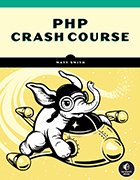
PHP Crash Course takes readers from beginner to professional in PHP programming using a mix of detailed examples and practice exercises. The book enables readers to develop fast, maintainable and secure websites quickly while learning the foundations of programming. It features customizable templates that help readers create modern webpages quickly using PHP scripts, HTML code and Bootstrap styling. It also teaches users to create web applications that collect, transmit and store user data with scripts that can communicate with PDO databases like MySQL.
Learn more about this book here.
8. Program Management for Open Source Projects: How to Guide Your Community-Driven, Open Source Project
Author: Ben Cotton
Publisher: The Pragmatic Programmers
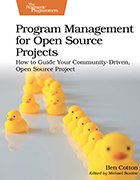
Program Management for Open Source Projects helps readers guide open source software projects to predictable, successful conclusions. It takes readers beyond project management to program management, which aims to implement only intentional processes that serve the project. Readers will learn how to communicate and build relationships, make informed decisions, design intentional processes, build a release schedule, manage software features and handle bugs effectively. It also helps program managers plan and ship software releases and choose tools effectively. Readers will learn to take both a big picture and micro-level view of projects. This book is good for anyone who wants to master the skills needed for program management.
Learn more about this book here.
9. Programming with OpenSCAD: A Beginner's Guide to Coding 3D-Printable Objects
Authors: Justin Gohde and Marius Kintel
Publisher: No Starch Press
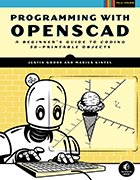
Programming with OpenSCAD is a comprehensive guide to the OpenSCAD 3D modeling language. This book explains the basics of creating 3D models with OpenSCAD, as well as how to use the language for more advanced projects. For example, the book covers topics such as creating variables, creating custom 3D shapes, scripting, rendering and animation. It also provides detailed instructions for the development of complex objects, extrusion from 2D shapes and coverage of computation concepts such as abstraction, decomposition and pattern recognition. All examples are provided with downloadable code, so readers can practice and explore the concepts in the book. Programming with OpenSCAD is an excellent resource for anyone looking to learn the powerful OpenSCAD language.
Learn more about this book here.
10. The Quick Python Book, Third Edition
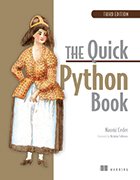
Author: Naomi Ceder
Publisher: Manning
The Quick Python Book is specifically for readers who are new to Python. This third edition includes new exercises to teach readers Python's easy-to-learn syntax. It gives background about the Python language and explains how the technology is open source in nature. Readers will learn about Python's large variety of libraries and frameworks and how they are used for simple and complex tasks such as system resource management and deep learning, respectively.
Learn more about this book here.
Some programming languages are especially important in different tech disciplines. Learn these five essential programming languages for cybersecurity.








